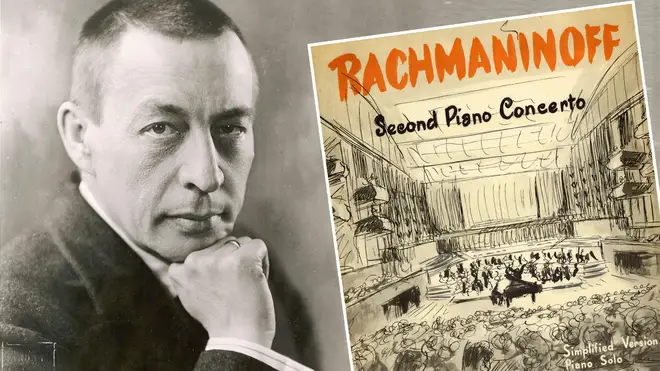On Air Now
Calm Classics with Ritula Shah 10pm - 1am
28 June 2023, 11:57

Famed for his monstrously difficult but heart-achingly beautiful piano concertos, Sergei Rachmaninov’s music is rich, melodious and endlessly rewarding.
From vast, sweeping piano concertos to luscious orchestral scoring and ravishing choral music, Russian master Rachmaninov’s music makes for a rich tapestry of high emotion and endless wonderful melodies.
Rachmaninov was born in Semyonovo, Russia, in 1873. The composer, pianist, and conductor was known for being somewhat cold and aloof on the outside, but certainly the opposite is true of his music.
Here are some of the all-time best pieces he wrote.
Read more: The 15 most famous tunes in classical music
Rachmaninov’s Piano Concerto No. 3 has one of the most sublime melodies of any piano concerto ever written in its first movement. Big call, we know, but it’s so moving we’ll stand by it. It’s also a ferociously difficult piece for even the most seasoned virtuoso. Listen to Russian pianist Victor Maslov tackling this epic of endurance and emotion below.
Read more: Best Chopin music: 10 essential pieces by the Romantic composer

Rachmaninov Piano Concerto No. 3 (I) | Victor Maslov | Classic FM Sessions
Rachmaninov’s Second Piano Concerto is widely described as the greatest piano concerto ever written. And listeners of Classic FM tend to agree, voting it right at the top of the Classic FM Hall of Fame every year. It’s an incredibly intense and melodious piece of music, ridiculously virtuosic for the soloist, and as expansive and lyrical as any of Rachmaninov’s writing. Stunning stuff.
Read more: The 20 best piano concertos of all time

Rachmaninoff: Piano Concerto no.2 op.18 - Anna Fedorova - Complete Live Concert - HD
Even though Rachmaninov’s short piece, Vocalise, was written for solo voice and orchestra originally, it is a song without lyrics. Instead, the singer can opt to perform the sublime melody through any vowel of their choosing. And of course, many instrumentalists have made the irresistible melody their own, and arrangements for the violin, the cello or the piano have become among the most well-known interpretations.
Read more: 9 of Clara Schumann’s all-time best pieces of music

Mischa Maisky. Rachmaninoff - Vocalise
Rachmaninov’s Vespers, also titled All-Night Vigil, was composed in 1915 and is among the composer’s more introspective works. He was deeply religious, and structured this unaccompanied choral work around the Christian church’s evening Vespers and morning matins.

Bless The Lord, O My Soul (S. Rachmaninoff "All-Night Vigil" / Vespers, op. 37, 2.)
Take a devilishly difficult theme for a solo violinist, give it to a pianist and accompanying orchestra, and make it even more virtuosic, dizzying and expansive. That’s what Rach has done with this brilliant theme, which was originally the Caprice No. 24 by Classical Italian composer and violinist, Niccolò Paganini.

Daniil Trifonov – Rachmaninov: Rhapsody On A Theme Of Paganini, Op.43, Variation 18
The premiere of Rachmaninov’s First Symphony was a disaster, but the opposite is certainly true of the reception around his Second Symphony. It’s a long work, an hour all up, and requires a lot of concentration from even the most experienced symphonic listener, but boy is it worth it. This is Rachmaninov at the very pinnacle of his orchestral oeuvre.

Rachmaninoff: Symphony no.2 op.27 - Radio Filharmonisch Orkest - Complete live concert in HD
Rachmaninov’s The Bells is a magnificent choral symphony featuring soprano, tenor and bass soloists. The text is a translation of the Edgar Allan Poe poem of the same name, and much of the music is based around the Gregorian ‘Dies Irae’ melody. And the real bonus? Rachmaninov fittingly composed a part for guest tubular bells. Divine.

Rachmaninoff: The Bells / De Klokken (Kolokola) - Radio Filharmonisch Orkest - Live Concert HD
Rachmaninov’s set of six miniature solo piano pieces is from 1896. Each moment is a wonderful Rachmaninovian reproduction of a musical form characteristic of a previous era of music – there’s a nocturne, a song without words, a barcarolle, an étude, and a theme and variations.

Alfred Brendel - Schubert - Six moments musicaux, D 780
The Prelude in G minor is Rachmaninov’s piano writing at its most dramatic. The opening is a very Russian, march-like flourish of intensity, and the piece never fails to delight and surprise. Rachmaninov performed the premiere of the piece himself, in Moscow, in 1903.

Rachmaninoff - Prelude in G Minor (Op. 23 No. 5)
Rachmaninov’s Sonata for Cello and Piano features lyrical, heart-wrenching melodies that create moments of deep reflection throughout this piece. It’s melodious, poised and ridiculously beautiful writing that exploits the full range of the expressive solo instrument it’s composed for.

Lugansky . Capuçon - Rachmaninoff, Sonata for Cello and Piano